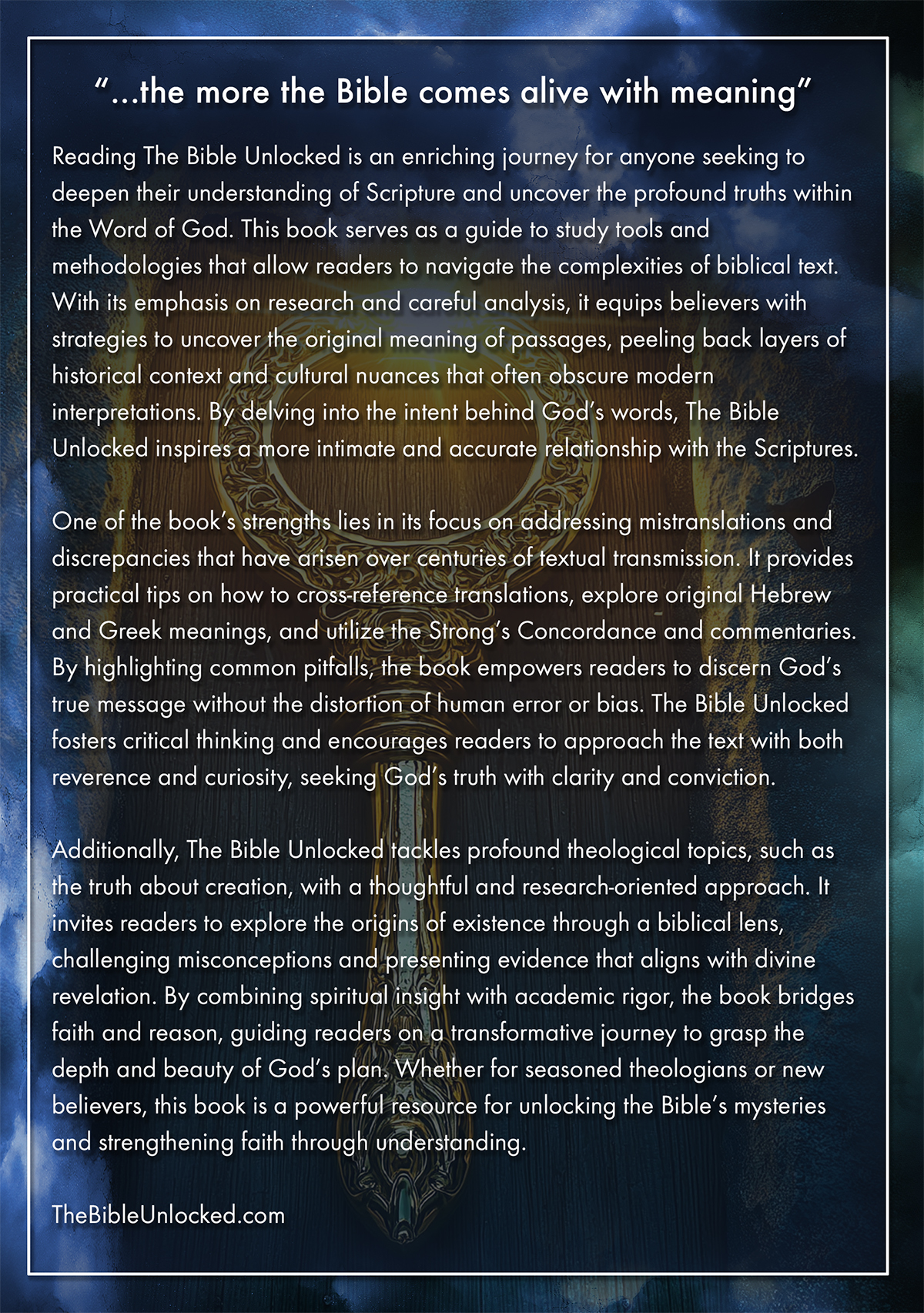

"...the more the Bible comes alive with meaning"
Reading The Bible Unlocked is an enriching journey for anyone seeking to deepen their understanding of Scripture and uncover the profound truths within the Word of God. This book serves as a guide to study tools and methodologies that allow readers to navigate the complexities of biblical text. With its emphasis on research and careful analysis, it equips believers with strategies to uncover the original meaning of passages, peeling back layers of historical context and cultural nuances that often obscure modern interpretations. By delving into the intent behind God's words, The Bible Unlocked inspires a more intimate and accurate relationship with the Scriptures.
CHAPTER 15
- Can I become one of the Elect?
If you understand God’s basic plan, knowing that Satan comes before Jesus and that you are called to stand against Satan with the power of the Holy Spirit, God may have already chosen you as one of His Elect.
However, if you believe you are part of the Elect but you pass away before Satan’s return, you would instead be part of what is called the remnant. Those who are a part of the remnant play a crucial role in God’s army, serving His purposes until the time comes.
To be absolutely clear: to be one of the Elect, you must be alive when Satan returns.
- Where are the remains and evidence of the giants (Nephilim) who were born when the fallen angels impregnated women?
This question requires a multidisciplinary approach, including archaeology, geography, history, science, and technology. While fallen angels are said to have been taken back to Heaven and are guarded by Michael until their future return, there are claims that bones of the Nephilim have been discovered.
Though some traditions suggest fallen angels could have been 450 feet tall and Nephilim 40 to 50 feet tall, there is no concrete evidence to support these assertions. However, bones measuring between 13 and 21 feet in height have reportedly been unearthed in geographic areas associated with Biblical accounts. Whether these remains are of Nephilim cannot be proven, but they add an intriguing aspect when doing research.
- What does it mean to speak in tongues?
This is a simple concept that has often been misunderstood, sometimes leading to the creation of false doctrines. Some groups even claim that speaking in tongues is a requirement for entering Heaven, a belief that is both unbiblical and sacrilegious, as it misdirects worship away from God.
Speaking in tongues can be categorized into two types:
- Divine Language through the Holy Spirit:
When touched by the Holy Spirit, speaking in tongues manifests as a divine language understood universally. Each listener hears the message in their native tongue without the need for interpretation. For example, in an audience of 1,000 people speaking different languages, everyone would understand the message in their own language. This phenomenon cannot be reproduced by human means and serves as a testament to the power of the Holy Spirit. If a group claims to speak in tongues but produces incoherent sounds or gibberish, it is not from the Holy Spirit and reflects false doctrine.
- Speaking in Different Languages:
The Bible also refers to speaking in tongues as the ability to speak or understand a foreign language. For instance, if you only speak English but wish to share the Gospel in China, you would require a Chinese interpreter. This practical aspect of communication is often misunderstood, despite the clarity provided in Scripture.
The confusion surrounding this topic stems from misinterpretation and deviation from Biblical teachings. Scripture, however, is straightforward on the matter.
- Divine Language through the Holy Spirit:
- I’m a New Christian. Is Satan the Only Evil We Are Fighting?
Unfortunately, no. There are many more enemies we face as Christians. However, remember that Jesus Christ has given us power over all our enemies, provided we act in His name. There is no need to fear those I’m about to mention, but it’s important to be aware of them.
Here is a partial list of Christian adversaries:
- Satan – The ultimate adversary, the deceiver of mankind.
- Kenites – The children of Cain, historically linked with subversive activities.
- Fallen angels – Angels who rebelled against God.
- Nephilim – The offspring of fallen angels and human women.
- Elioud – Descendants of the Nephilim.
- Anak – Beings who are a mixture of humans and spiritual entities.
- Anakim (Anakites) – Giant descendants of Anak, associated with evil.
- Cambions – Offspring of a demon and a human.
- Nethinims – Associated with the Kenites, they influenced changes in sacred duties and doctrines.
- Goyim – Also linked with the Kenites and known for causing trouble.
When dealing with individuals connected to these groups or their offspring, exercise discernment. Entering into close relationships, such as marriage or business partnerships, can lead to significant difficulties. They may deceive, lie, or exploit you. Use wisdom, and when in doubt, it’s often best to keep your distance.
If you have clarity and experience, you may attempt to plant a seed of truth and move on. Ultimately, God’s angels will ensure that these enemies are dealt with in His divine timing.
Above all, rely on the power of our Lord and Savior, Jesus Christ. Put on the full Armor of God as described in Ephesians 6:10-18, and trust in His wisdom and protection against all adversaries.
- Why does the Bible say not to call people fools, yet uses the term throughout its text?
The discrepancy arises from translation nuances. A more accurate translation reveals that the Bible advises against declaring someone void of spiritual hope. There is always hope for every individual, regardless of their knowledge or actions.
While the term “fool” appears frequently, it often reflects behavior, rather than condemning someone’s spiritual future. All of us have acted foolishly at times, but none of us are beyond redemption. Satan is the only being considered entirely void of spiritual hope. Though others may face this fate, they have not yet been identified.
- Do pets go to Heaven?
Yes, God loves His creations, including animals. Pets existed in the First Earth Age, they are with us now, and they will continue to exist in eternity. In the eternal realm, even animals will have spiritual bodies. This transformation means animals will not eat each other, nor will we – in our spiritual bodies – consume them.
- What does the Bible say about tattoos?
The Bible advises against making gashes or markings for the dead, a practice associated with pagan rituals. When considering tattoos, the key question is: Who are you glorifying? Tattoos that honor God can be seen as good, while those that glorify evil or Satan are not. Ultimately, this is a matter of personal discretion and free will.
- What happens to someone who commits suicide?
Judgment belongs to God alone. Factors like mental health or chemical imbalances may influence a person’s actions, and we cannot fully understand their struggles. While suicide results in the loss of one of God’s children, and the individual may face God’s displeasure upon reaching paradise, their ultimate fate rests in God’s hands. Only He decides their place in the afterlife.
- Is gambling a sin?
Gambling is not inherently a sin, if done responsibly. If you have extra spending money and set a strict limit, it is acceptable. However, using money meant for essentials, like your children’s needs or household bills, is sinful. If gambling causes you to lose your family, friends, or home, it is clearly destructive and sinful. Moderation and common sense are key.
- Is it a sin for a Christian to drink alcohol?
The Bible says it is good to drink a little wine for the sake of the stomach (1 Timothy 5:23). However, it does not condone drinking excessively or getting drunk. Drinking in moderation is not a sin, but overindulgence is. Once again, use common sense and practice self-control.






